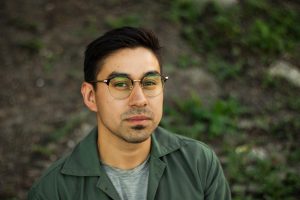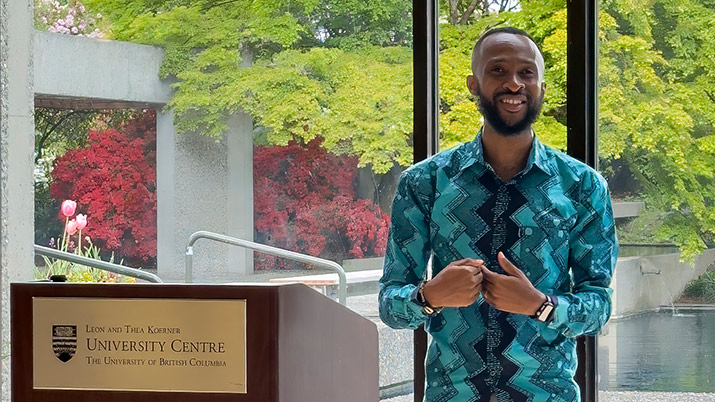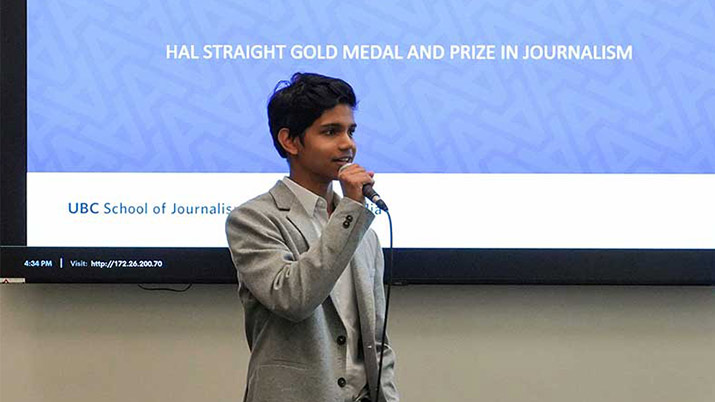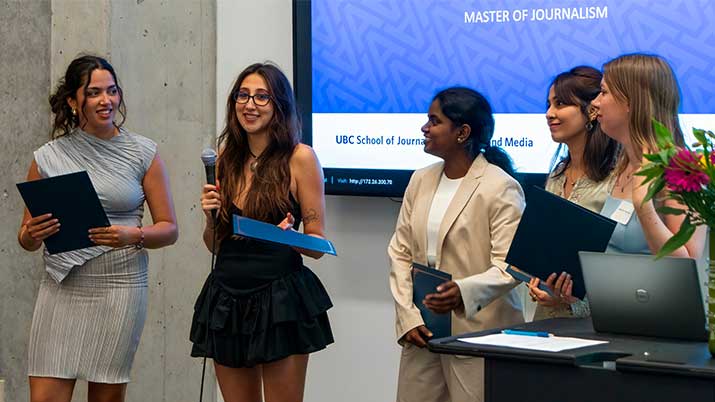Jonathan Ventura obtained his UBC Master of Journalism degree in 2019. Ventura is a video journalist at CBC Manitoba and was part of UBC’s Global Reporting Program that investigated the global fishmeal industry in 2019. Recently, Ventura filmed parts of the Turning Points documentary short series produced by the Global Reporting Centre that explored alcohol use, addiction, resilience and healing in Yellowknife.
Ventura shares his experience working as a videographer on the Turning Points project and explains how grad school helped him become the journalist he is today.
Here’s what he had to say.


Can you tell us a bit about your work in the Turning Points story?
Yes! It was an amazing experience, and a unique opportunity to sort of do journalism differently, in a collaborative manner. The vision for this project came from the Global Reporting Centre, but was really community-led in terms of the storytelling and the final product. I got a chance to go up to Yellowknife to do some of the filming. That was a great contrast to my current job which is more traditional news in a daily news setting. Reflecting back, I realize how special that project was, not only the way in which the stories were told, which was community-led, by storytellers themselves who had full ownership over their stories but also, the techniques of storytelling that we were able to implement. It was a little bit different than traditional broadcast journalism that you find in daily news. To be able to use different filming techniques, website composition that has these different elements of creativity, and ways of doing journalism differently really added up to this special project. And that I think it’s been very well received not only by the community in Yellowknife, but also by the audience members who have watched it in the United States and in Canada.
What sets this project apart from the rest?
I think just spending time with the people involved. Not only while interviewing and filming, but also spending time with them so that they understand the process as well. I think when we often call somebody for an interview, they might understand that at the end of it all there will be an article or perhaps a video, but very rarely do we get the chance to explain and have them involved throughout the whole process. It can be a little time consuming but I think the end result really reflects just how different the work itself is.
You took the Reporting in Indigenous Communities (RIIC) course at UBC. How has that course helped you?
I think courses like RIIC, everybody should try and take it because it’s so unique and special. When you’re a journalist in Canada and in North America, it really does change the way that you do journalism in a better way. I think it’s special to have seasoned journalists like Duncan McCue and others who have learned from mistakes of the past and have found different ways of storytelling, and have deep roots in all sorts of communities. They help you understand what your role and responsibility is, as a journalist in Canada, because even if you aren’t interested in solely reporting on Indigenous issues, we do live in North America where colonization has saturated into every part of our lives. So we need to really understand how to handle those stories responsibly, how to do them better, and want to do them better, because I think journalism has failed a lot of communities in different ways. It’s important that we think critically about that, and also think about how to practically do things a little bit better. That includes so many different communities, but definitely reporting in Indigenous communities is part of that.
Why did you join journalism school?
Grad school as a whole, I think, was super valuable in trying to do things differently, and trying to do things better and also, having the time and space to do that. It’s unique, because when you’re in a newsroom, you don’t really have that opportunity. But I do really lean on those years of having sort of space and time to reflect on how to do journalism responsibly. That’s just innately in me, when I’m under a deadline or when I’m in a time crunch in the newsroom. Those things, I believe, just come a little bit more naturally, which I think is not the case for every journalist. That’s why I went to journalism school. To sort of think about journalism a little bit differently, and be able to practically implement what I learned in the real world.
Did you have any journalism experience prior to coming to UBC?
No, I didn’t really have that much journalism experience. I experimented with creating my own magazine and I’ve done a lot of research in my past jobs, like university research, video storytelling, but I hadn’t really thought of journalism in the way that grad school had helped me think of it. For example, developing skills in terms of writing and producing content. So it definitely helped me build on those essentials, and those central foundations to do journalism.
Any J-School highlights during your time here?
I’d say some of the highlights are definitely the international reporting program (Global Reporting Program) that I was lucky enough to participate in. We got to travel to Peru and work collaboratively as a team which not a lot of news outlets or employers have, like, they don’t really work collaboratively. So having that chance to work in relation to other people and communities in a large sort of investigative group was really great. And then Reporting in Indigenous Communities was also an incredible opportunity to kind of expand on a topic that I had already really been interested in and learn from some of the best reporters in Canada, who are deeply involved in issues of Indigenous communities. So those two and then the relationships that I built during those years are some other highlights. Having Kathryn Gretsinger’s support was instrumental to my development. She’s such a vital resource to the school, along with so many other professors, like Peter Klein. There are so many great people who are there to really support you and do believe in you as an individual and your abilities, even when you don’t, as a new journalist. They are able to show you what’s possible and tell you to reach for the stars, and encourage you to do so. That’s something that in my life, I’ve never really had—people telling me that I can do anything, like you know, having your video published on NBC News is possible, or PBS news is possible. I would never have thought that for myself. The result of having those professors believe in you and support you is that you are able to sort of achieve goals that you never thought were possible.
How is daily news reporting at CBC Manitoba different from your past projects?
I think daily news reporting is great in some respects, in the sense that there’s always something different happening every day and constantly writing different stories is refreshing. I think CBC is also changing in terms of the content that they create and the communities they’re trying to reach. They’re really trying to push for video being a huge part of their platform. So I was pushing the boundaries of journalism and video at UBC and trying to create something a little bit different and I’ve been able to continue to try and do that at CBC. So it’s different. It’s a very fast-paced environment, but I’m still trying to continue to create video that’s kind of more cutting edge.
Are there any projects we should look out for?
I’m working on a project right now about the Inuit Art Centre. The Winnipeg Art Gallery has created a specific Centre which I think will house the largest collection of Inuit art in the world. So I’m working on some feature videos for that. I’m lucky they know that my work is a little bit more creative and that they’ve trusted me to work on these feature videos for this Art Center, which is sort of a world first. And yeah, it’s going well. It’s hard to be reporting during a pandemic, especially doing video, but I think that’s part of it. People see your work, and the work that I did at UBC, and the work that I’m passionate about doing, and they sort of trust you in that regard, and give you time to do that.
What does a typical workday in Jonathan Ventura’s life look like?
Every day starts with a 9:00 a.m. pitch meeting. So I go into a meeting with my producers and fellow colleagues where everybody pitches their stories. Then I go back and answer a few emails before I get my assignment for the day. After that, I sort of get on the phone and just start calling and setting things up. I go out and film within a time crunch and by one o’clock, I’m usually back. Then, it’s editing, writing scripts, cutting video and radio clips. By five o’clock everything is ready for TV, and ideally, the article is also almost done and the radio clips are into radio. So it’s a busy day for sure but it makes the day go by fast.


